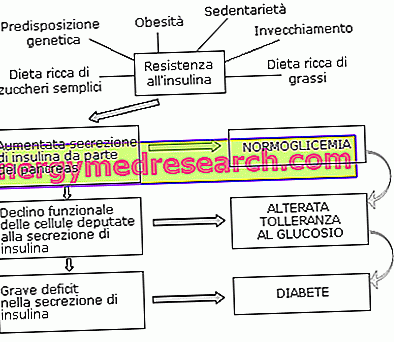Definition Diabetic neuropathy is a complication of diabetes that can affect both the peripheral and the autonomic nervous system. This pathological condition results, in particular, from the combination of: Microangiopathy, vascular alteration related to diabetes that causes ischaemia of the capillaries that supply nerves
Category diabetes
What is Diabetes Diabetes is one of the most widespread endocrine diseases in industrialized countries: it is a pathology characterized by hyperglycemia, hence by the increase in blood sugar; it is caused by reduced insulin secretion by the pancreas, which is often associated with an increased resistance of peripheral tissues to the action of insulin itself
Herbal tea 1 against diabetes Walnut, Juglans regia (leaves) 50g; Bean pods, Phaseolus vulgaris (pods) 50g. With these two drugs you prepare a decoction, letting it boil for 20 minutes: once filtered you can drink 3-5 cups during the day. In this decoction, bean pods and walnut leaves were used: the bean is used as a mild hypoglycemic agent due to the presence of chromium, which acts in the regulation of blood glucose, and of fibers, which reduce the intestinal absorption of glucose; the leaves of the walnut possess a discreet hypoglycemic activity, useful above all in the cases of type 2 diabe
Watch the video X Watch the video on youtube Blood glucose is the amount of glucose in the blood. Both the deficiency (called hypo-glycemia) and the excess (called hyperglycemia) of glucose in the blood can be very harmful. Excess is less symptomatic than the defect. However, in the long term, chronic hyperglycemia causes even serious metabolic complications
Watch the video X Watch the video on youtube Generality Lowering blood sugar is a need for people with high blood glucose levels, to ward off the dangerous consequences of a condition known as hyperglycemia. Typical of diabetes mellitus, hyperglycemia is responsible for characteristic symptoms, including: dry mouth, intense thirst, abdominal pain with vomiting, breath from the smell of acetone, progressive alteration of consciousness, etc
Definition The altered tolerance to glucose or IGT (acronym of Impaired Glucose Tolerance ) is a condition in which the glycaemia - two hours after the oral load with 75 grams of glucose - takes values between 140 mg / dl and 200 mg / dl . Diagnosis The test used to diagnose impaired glucose tolerance is called OGTT or an oral glucose loading curve: after a fast of at least eight hours, a preliminary glycemic test is performed on a small venous blood sample; at the end of the collection the patient is invited to ingest a liquid meal based on 75 grams of glucose dissolved in 250-300 ml of wate
Definition The altered fasting glycaemia or IFG (acronym of Impaired Fasting Glucose ) is a condition in which blood glucose levels, detected in fasting for at least eight hours, exceed the normal limit excessively while remaining below the values that sanction the diabetic state. For this reason, when an impaired fasting blood sugar is detected, one often speaks of prediabetes , a yellow light that should invite the patient to pay more attention to nutrition and the level of daily physical activity. He
Generality Amylin is a peptide hormone synthesized by pancreatic β cells together with insulin, and co-secreted in response to meals and hyperglycemic conditions. Like insulin, amylin is particularly active in glucose metabolism, so much so that its synthetic analogue ( pramlintide ) has been authorized by the FDA as a medicine to treat diabetes mellitus (trade name Symlin ®), both type I and type II, in synergy with insulin.
Premise Diabetes mellitus , or more simply diabetes , is a metabolic disease caused by alterations in insulin, a key hormone for maintaining normal blood glucose (sugar) levels. There are different types of diabetes mellitus, some decidedly more common and known than others. The most common types include type 1 diabetes, type 2 diabetes and gestational diabetes; among the less common, however, are the so-called secondary diabetes and MODY diabetes
Generality Diabetic ketoacidosis is a serious complication of diabetes mellitus, particularly of the insulin-dependent one (type I and more rarely type II); it is in fact caused by an absolute deficiency of insulin, in response to which the body produces significant quantities of ketone bodies. Causes When glucose fails to enter cells, they adapt to using mainly fatty acids, whose metabolism - in the absence of adequate intracellular glucose quantities - turns towards the synthesis of substances called ketones or ketone bodies
Premise The complications of diabetes (or diabetes mellitus ) are the unpleasant consequences that can arise from this serious metabolic disease. Diabetes is caused by a deficiency of insulin - a key hormone for maintaining normal blood glucose levels - and its characteristic clinical sign is the high concentration of glucose in the blood ( hyperglycemia )









